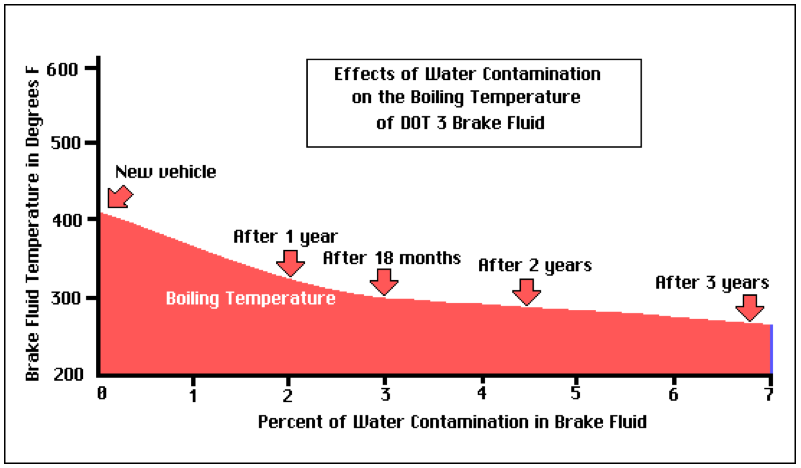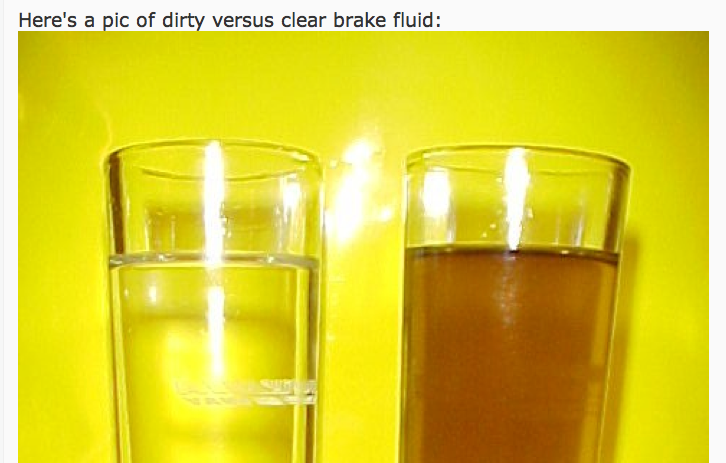garyahouse
newbs need the forum
Why should brake fluid be changed?
Every fluid ought to be changed on occasion, usually because of particulate comtaminants and/or chemical breakdown. Brake fluid, however, has an additional issue. Unlike oil, it is hygroscopic (not hydro... as some have printed). It absorbs water. Believe it or not, rubber hoses are porous. They shed particulate matter into the brake fluid as they age, and allow moisture to penetrate as well.
Bikers are known for two things: changing (and sometimes obsessing over) their oil more often than necessary, and, like most auto owners, changing their brake fluid less often than necessary. The rule of thumb is 2 years, but consider the graph below:

Between 1 year and 18 months, the contamination curve tapers off: the lion's share of water absorption is done within 18 months. This graph shows how the boiling temperature of brake fluid changes over time. Note: graph represents DOT 3 fluid. Numbers are higher for DOT 4, but the concept is the same.
Does it really matter that much?
It's important to change fluid often because boiling water in brake fluid produces gas, which can be compressed. Get enough of it in your brake fluid, and you brakes get spongy. Translation: too much water + too much heat = spongy brakes.
In addition, when water is mixed with brake fluid, it does not change color. Water is clear. That is why simply looking at the color of your brake fluid is not an accurate way to assess it's condition. Want proof? Check paragraph 5 in this tech article. CLICKY The real problem most of us face with brake fluid is NOT that the fluid is "burnt" for lack of a better word, but that it's GOT water in it. This water causes more than just a lower boiling point. It also causes corrosion. This corrosion causes damage to the inside of calipers and antilock brake system components. Any bike mechanic will tell you that they've taken what looks like sand out of calipers. Actually, it's metal that has eroded from vital brake system parts. This corrosion is the number one reason why brakes "stick" causing warped rotors, and this "sand" doesn't help things either.
Why does brake fluid get dark?

Remember: "good" color does not = good brake fluid.
As brake fluid collects heat through the calipers when they get hot, it goes through multiple heating and cooling cycles, and begins to change color. These cycles cause expansion and contraction of system fluid volume, which has no effect on the color of the fluid, but does cause a huge problem with moisture in the fluid. It results in a tiny bit of air coming and going from the cap of the master cylinder. In addition, air molecules actually enter the system from a number of sources, including the rubber hoses and the seals. Don't believe air can pass through rubber? Ever see a deflated balloon? Anyway, with this air comes moisture. Again, no change in color, but a huge change non the less.
It also picks up particulate contamination from wearing metal surfaces and the oxidation of rubber hoses. One tech article pointed out that it was normal for fluid to change color as it leached the color from brake hoses, and that tests concluded that there was nothing wrong with the performance of the fluid, even though it had changed color.
How to prevent brake fluid problems
Make sure you use the right kind of brake fluid. There is more than one type out there. FJR's use DOT 4. Don't mix and match.
Be very cautious about using brake fluid from an a previously opened/stored container. Think of brake fluid like a chemical vacuum cleaner, always attempting to suck moisture from the atmosphere 24/7.
Change the fluid often, and keep accurate records.
When changing or bleeding brake fluid always replace master cylinder caps as soon as possible to prevent moisture from entering into the master cylinder.
What's the big deal: why should I care?
Your brake fluid WILL become contaminated with moisture, it's inevitable. There's no way to avoid it. Your best defense is to keep a regular schedule of replacing it. Failure to do so will result in internal corrosion and may result in spongy brakes or even brake failure.
When should brake fluid be changed?
Ideally, every year. It's sooooo easy to do. And you should change the hydraulic clutch fluid for the same reason.
Final thoughts
There are two things we risk by not changing this fluid often enough. Spongy breaks and corrosion. But since the fluid always gets changed when we discover sponges, the big issue, and the more expensive of the two, is the corrosion. Since this corrosion usually doesn't show up until a great deal of damage has been done, by the time we figure out that there's a problem, it's too late: you better take out a loan. Lesson to be learned? Don't be fooled into thinking that your fluid is fine just because it's light in color, or that it's bad just because it's dark in color. When it comes to brake fluid, we need to be as concerned about the calendar as we are about the color.
Me? I change it once a year: problem solved.
Gary
darksider #44
Every fluid ought to be changed on occasion, usually because of particulate comtaminants and/or chemical breakdown. Brake fluid, however, has an additional issue. Unlike oil, it is hygroscopic (not hydro... as some have printed). It absorbs water. Believe it or not, rubber hoses are porous. They shed particulate matter into the brake fluid as they age, and allow moisture to penetrate as well.
Bikers are known for two things: changing (and sometimes obsessing over) their oil more often than necessary, and, like most auto owners, changing their brake fluid less often than necessary. The rule of thumb is 2 years, but consider the graph below:

Between 1 year and 18 months, the contamination curve tapers off: the lion's share of water absorption is done within 18 months. This graph shows how the boiling temperature of brake fluid changes over time. Note: graph represents DOT 3 fluid. Numbers are higher for DOT 4, but the concept is the same.
Does it really matter that much?
It's important to change fluid often because boiling water in brake fluid produces gas, which can be compressed. Get enough of it in your brake fluid, and you brakes get spongy. Translation: too much water + too much heat = spongy brakes.
In addition, when water is mixed with brake fluid, it does not change color. Water is clear. That is why simply looking at the color of your brake fluid is not an accurate way to assess it's condition. Want proof? Check paragraph 5 in this tech article. CLICKY The real problem most of us face with brake fluid is NOT that the fluid is "burnt" for lack of a better word, but that it's GOT water in it. This water causes more than just a lower boiling point. It also causes corrosion. This corrosion causes damage to the inside of calipers and antilock brake system components. Any bike mechanic will tell you that they've taken what looks like sand out of calipers. Actually, it's metal that has eroded from vital brake system parts. This corrosion is the number one reason why brakes "stick" causing warped rotors, and this "sand" doesn't help things either.
Why does brake fluid get dark?

Remember: "good" color does not = good brake fluid.
As brake fluid collects heat through the calipers when they get hot, it goes through multiple heating and cooling cycles, and begins to change color. These cycles cause expansion and contraction of system fluid volume, which has no effect on the color of the fluid, but does cause a huge problem with moisture in the fluid. It results in a tiny bit of air coming and going from the cap of the master cylinder. In addition, air molecules actually enter the system from a number of sources, including the rubber hoses and the seals. Don't believe air can pass through rubber? Ever see a deflated balloon? Anyway, with this air comes moisture. Again, no change in color, but a huge change non the less.
It also picks up particulate contamination from wearing metal surfaces and the oxidation of rubber hoses. One tech article pointed out that it was normal for fluid to change color as it leached the color from brake hoses, and that tests concluded that there was nothing wrong with the performance of the fluid, even though it had changed color.
How to prevent brake fluid problems
Make sure you use the right kind of brake fluid. There is more than one type out there. FJR's use DOT 4. Don't mix and match.
Be very cautious about using brake fluid from an a previously opened/stored container. Think of brake fluid like a chemical vacuum cleaner, always attempting to suck moisture from the atmosphere 24/7.
Change the fluid often, and keep accurate records.
When changing or bleeding brake fluid always replace master cylinder caps as soon as possible to prevent moisture from entering into the master cylinder.
What's the big deal: why should I care?
Your brake fluid WILL become contaminated with moisture, it's inevitable. There's no way to avoid it. Your best defense is to keep a regular schedule of replacing it. Failure to do so will result in internal corrosion and may result in spongy brakes or even brake failure.
When should brake fluid be changed?
Ideally, every year. It's sooooo easy to do. And you should change the hydraulic clutch fluid for the same reason.
Final thoughts
There are two things we risk by not changing this fluid often enough. Spongy breaks and corrosion. But since the fluid always gets changed when we discover sponges, the big issue, and the more expensive of the two, is the corrosion. Since this corrosion usually doesn't show up until a great deal of damage has been done, by the time we figure out that there's a problem, it's too late: you better take out a loan. Lesson to be learned? Don't be fooled into thinking that your fluid is fine just because it's light in color, or that it's bad just because it's dark in color. When it comes to brake fluid, we need to be as concerned about the calendar as we are about the color.
Me? I change it once a year: problem solved.
Gary
darksider #44
Last edited by a moderator:






























































